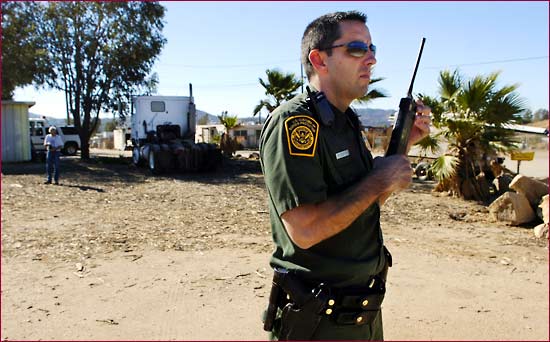President Obama proposes cutting border security in 2011 federal budget

Possibly indicating what direction the president might lean on comprehensive immigration reform, the Washington Examiner reports that President Obama has proposed cutting U.S. border security as part of his 2011 budget. This includes two specific provisions:
1. Reducing the amount of Border Patrol agents.
2. Cutting funding for a “virtual fence” along the U.S.-Mexico border, which is the technologically-advanced fence armed by several surveillance devices.
Overwhelmingly, Republicans do not see the current immigration reform effort as effective, labeling it as a blanket amnesty bill and as soft on other border-related crimes. With this in mind, the right will likely paint the Democrats as weak on national security with the new cuts.
Meanwhile, in addition to portraying themselves as friendly to the Hispanic community, Democrats will likely play up the effectiveness of the administration’s decision. In other words, more money does not equal less illegal immigration and border-related crime. In a sense, this may be true.
Then again, it might just depend on how those particular resources are allocated. Illegal immigration activity still continues to this day despite increased funding for border patrol under the Bush administration.
So what is the Obama administration’s proposed solution?
With upcoming comprehensive legislation in play, the administration seems to be laying the foundation for passage by narrowing its efforts. According to the Examiner, the administration will shift their money away from trying to catch illegal immigrants coming across the border of Mexico with California, Arizona, New Mexico, and Texas.
Instead, funds will go toward Border Enforcement Security Task Forces in non-border cities. These cities include Honolulu Hawaii; San Francisco, California; and Massena, New York. These task forces will seek to prevent illegal drugs from being dispersed by criminal organizations across U.S. borders.
This will most certainly delight advocates of a comprehensive immigration reform bill, some of whom recently chanted ‘No human being is illegal’ at the recent May Day rally in Washington DC and at similar rallies across the nation.
However, with this new approach, some might see that the mark is being missed by having less eyes on the border and more shifted inland to drug distributors. Shifting enforcement to some major cities listed might work in a place like Florida, which does not border a foreign territory and does not provide easy access between countries.
But it most surely will not alleviate the crime occurring in states that border Mexico, where drug cartels cross over with fresh supplies on a frequent basis.
Perhaps the true solution is not to abandon the federal role in immigration altogether. After all, it is their constitutional responsibility.
Or rather, perhaps it is the role of the federal government to allow the states to have more control over their immigration enforcement. For instance, the Arizona model of immigration enforcement already has some illegals leaving the state.
Perhaps California would also benefit from Arizona's model of immigration enforcement.




